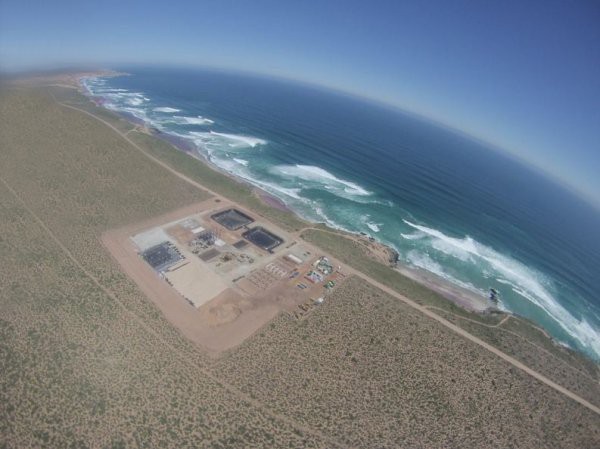
Aerial view of Tormin mine on the west coast. Photo from Tormin promotional video.
20 March 2017
Australian mining company Mineral Sands Resources (MSR) has emerged with the major share of legal spoils from its High Court review application relating to a search-and-seizure operation at its Tormin mine on the West Coast last year.
The operation was authorised under a warrant issued by Vredendal magistrate CS Kroutz and conducted by government environmental officials led by the Green Scorpions in September. It followed complaints of alleged environmental mismanagement and illegalities in mining operations to extract heavy minerals from the beach.
Just days after the search-and-seizure, MSR brought a review application in the Western Cape High Court challenging the validity of the warrant.
In judgment delivered on Monday, Judge Owen Rogers ruled that the warrant was indeed invalid and set it aside. Awarding costs to MSR, he said it had achieved “substantial success” in its application.
However, the mining company did not get all it was looking for, and the judge also made it clear that his decision did not preclude a future search-and-seizure operation in respect of the same complaints, if the warrant was properly authorised.
The environmental officials had been looking for evidence relating to five complaints about the mining company; namely, that it:
The judge said there had been no “egregious” [outstandingly bad; shocking] conduct in the execution of the warrant, and he refused MSR’s application for evidence seized during the operation to be destroyed.
Instead, he issued a preservation order, in terms of which one full copy of all the evidence seized must be made and held under seal by the Registrar of the High Court until a possible criminal case against MSR in respect of the charges has been concluded or the National Prosecuting Authority formally declines to prosecute.
The original documents were all returned to MSR and the investigators did not seize or copy any electronic data. All other copies must be destroyed (apart from a copy to be sent to MSR’s attorneys) and an affidavit deposed to this effect.
Crucially, the judge also said that, based on information contained in affidavits presented in court, the charges against the mining company “cannot be said to lack substance”.
Referring to the decision by the Department of Mineral Resources (DMR) to approve MSR’s application to amend its environmental management plan for Tormin in April 2015 – after complaints had been lodged – he wrote:
“Even if some aspects of MSR’s conduct became lawful as from 14 April 2015 (which I doubt), the DMR’s decision of that date did not retrospectively legitimise the activities in question. If MSR took matters into its own hands and only sought the necessary approvals after the event, such conduct is to be strongly deprecated.”
If the cliff failure had been caused or exacerbated by MSR’s unauthorised decision to move the PBCs (primary beach concentrator machinery) on the beach to the SCP (secondary concentrator plant) on the cliff top site in late 2013, “that is a very serious matter”, he added.
Judge Rogers found that the warrant was invalid in respect of the “increased footprint”, “jetty” and “road” charges because the investigation had not been within the mandate of the national environmental inspectors, following legislative changes of 8 December 2014 that saw the introduction of the government’s new One Environmental System for mining. This system gave the Department of Mineral Resources (DMR) exclusive jurisdiction for compliance monitoring and enforcement of environmental authorisations for all prospecting and mining operations.
In respect of both the “cliff” charge and the “increased footprint”, “jetty” and “road” charges, the warrant was invalid because the DEA had failed to disclose details of the One Environmental System to the magistrate, and had not informed him about MSR’s challenge to the DEA’s authority to conduct the search-and-seizure.
In respect of the “dumping” charge, the evidence presented to the magistrate had been “too confusing and unclear to constitute reasonable grounds for suspecting that the dumping offence was being or had been committed” said Judge Rogers.